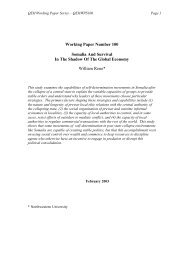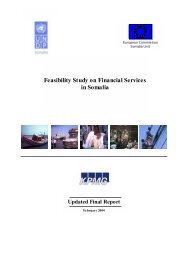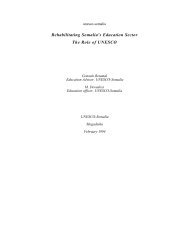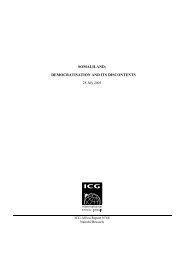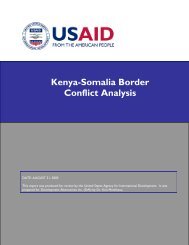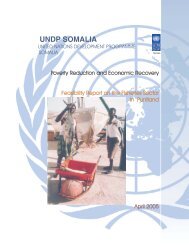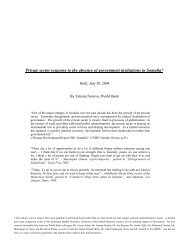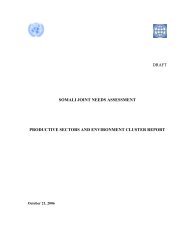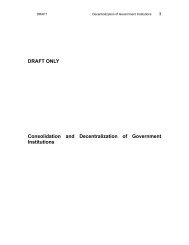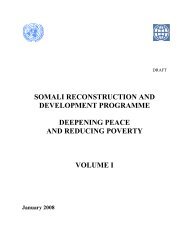Primary Education Survey Evaluation Report Somalia - Somali - JNA
Primary Education Survey Evaluation Report Somalia - Somali - JNA
Primary Education Survey Evaluation Report Somalia - Somali - JNA
You also want an ePaper? Increase the reach of your titles
YUMPU automatically turns print PDFs into web optimized ePapers that Google loves.
PES <strong>Evaluation</strong> <strong>Report</strong>, 2008<br />
Appendix 2 Terms of Reference<br />
Terms of Reference for the Engagement of an <strong>Evaluation</strong> Expert<br />
<strong>Evaluation</strong> of the Annual <strong>Primary</strong> <strong>Education</strong> <strong>Survey</strong> in <strong><strong>Somali</strong>a</strong><br />
1. BACKGROUND<br />
1.1 Country Background<br />
With an overall Human Development ranking of 161 out of 163 countries on the human development<br />
index, available data on <strong><strong>Somali</strong>a</strong> points towards enormous gaps in meeting the needs of women and<br />
children in the social sector. The country has not had a de facto central government authority, or any other<br />
feature associated with an established independent state since the last 15 years. Functioning regional<br />
governments have been formed in the Northwest (<strong>Somali</strong>land) and Northeast (Puntland), and more<br />
recently a Transitional Federal Government was formed in 2004 but with very limited de facto authority.<br />
1.2 UNICEF Country Programme<br />
UNICEF has had a large field and programme presence in <strong><strong>Somali</strong>a</strong> over the last 15 years, with three zonal<br />
offices. A new country programme, within the framework of the United Nations Transition Plan, will aim<br />
to accelerate progress towards targets 3-8 of the Millennium Development Goals by further increasing<br />
access to basic services for accelerated child survival and development through humanitarian assistance,<br />
strengthening the institutional capacity of government as a duty bearer and further enabling children and<br />
women to claim their rights.<br />
1.3 UNICEF <strong>Education</strong> Programme<br />
Notwithstanding the work done by international development and relief organisations, access to basic<br />
education and gender equity in education in <strong><strong>Somali</strong>a</strong> remains a real concern. With a Gross Enrolment<br />
Ratio of 30 per cent, overall primary school enrolment ranks among the lowest in the world. In terms of<br />
gender equity, the <strong>Somali</strong> girl child has even less chance of accessing basic education. After 17 years of<br />
an emergency-driven response in <strong><strong>Somali</strong>a</strong>, the absence of a viable education system continues to hinder<br />
<strong><strong>Somali</strong>a</strong>’s progress towards meeting the Millennium Development Goals (MDGs) and <strong>Education</strong> For All<br />
(EFA) goals.<br />
In this context, the new UNICEF “Go to School” programme will aim to improve access to and quality of<br />
basic education with an emphasis on developing mechanisms to increase girls’ enrolment. In addition, an<br />
institutional development component will provide financial support and expertise to the existing<br />
ministries of education for the development and implementation of gender-sensitive education policies<br />
and standards, including the development of an effective <strong>Education</strong> Management Information System.<br />
1.4 The <strong>Primary</strong> <strong>Education</strong> <strong>Survey</strong><br />
The <strong>Primary</strong> <strong>Education</strong> <strong>Survey</strong> (PES) has been conducted almost every year for the last nine years.<br />
However, no formal evaluation of the <strong>Survey</strong> has ever been carried out. The original purpose of the<br />
survey was to fill a critical data gap in the education sector and to meet the information needs of the<br />
Ministry’s of <strong>Education</strong> (MoEs), national and international development stakeholders as well as donors,<br />
with an independent, reliable and routine source of data for trend analysis and programme planning. The<br />
PES has evolved over the years with additional data elements being added to meet the growing needs of<br />
48



